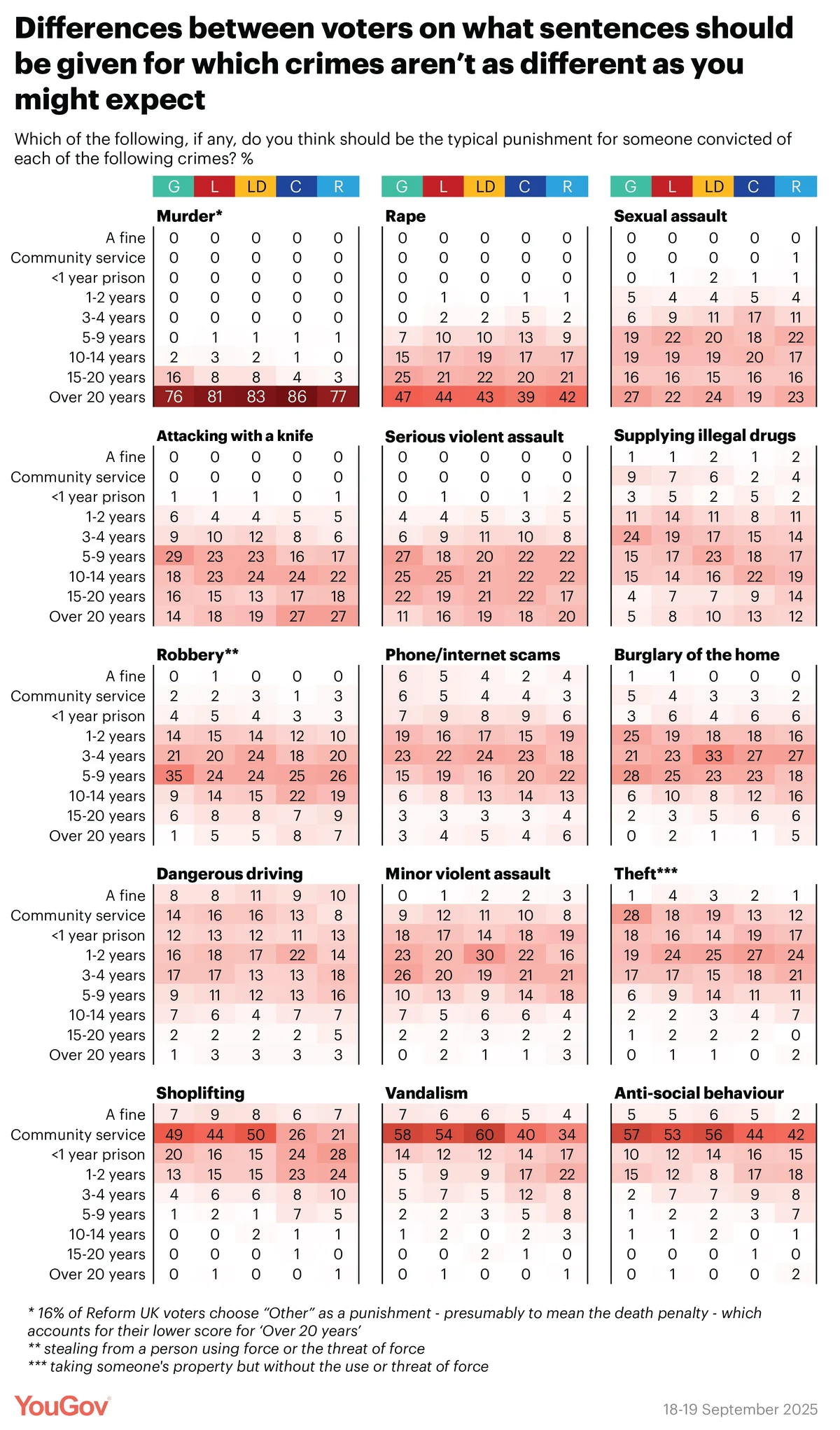The public give tougher sentences than the justice system
A new YouGov survey looks at what sentences the public would give for 15 crimes, how that compares to actual sentencing, and how the views of voters and other social groups differ.
At the most serious end of the list of crimes we asked about, fully 82% of Britons think that murder should receive a prison sentence of more than 20 years.
Imprisonment of two decades or more is also the most commonly given sentence for rape, at 43%, with a further 20% answering 15-20 years.
Between one in six and one in four Britons also pick a 20+ year prison sentence as a punishment for serious violent assault (18%), attacking someone with a knife (22%), and sexual assault (24%). However, the distribution is much more spread on these crimes, with similar numbers also saying these crimes should receive 5-9 year, 10-14 year, or 15-20 year sentences.
At the less serious end of the table, we see almost half of the public saying that community sentences should be awarded for anti-social behaviour (46%) and vandalism (47%).
With shoplifting a particular area of concern at the moment, we see that the most common sentence given by the public is community service (35%), with a further 8% suggesting a fine. Otherwise, one in five (20%) favour a short prison sentence of less than a year, while a similar number would want to see shoplifters locked up for 1-2 years.
How do attitudes on sentencing differ by age, gender and party?
Readers might be surprised to find that the length of prison sentences different voting groups offer for the various crimes do not differ as much as you might think – although there is still an underlying trend of Green voters being the most lenient when it comes to sentences and Tories and Reform voters being the toughest.
Where differences between voters are most readily apparent is on whether or not to give custodial sentences for some of the less serious crimes.

For instance, while 53-58% of Labour, Lib Dem and Green voters chose a non-custodial sentence for shoplifting, this figure falls to 32% of Tories and 28% of Reform UK voters.
The same story plays out for vandalism, which Tory and Reform voters are on average 22 points less likely to award a non-custodial sentence than the other parties, and 14 points less likely for anti-social behaviour.
Breaking the results down by age paints a broadly similar picture as breaking them down by vote – hardly surprising given the two correlate so strongly. However, there is one distinct difference in the age results that is not as obvious in the political results: that the youngest Britons are much harsher when it comes to sentencing for sex crimes.
For instance, while 62% of 18-24 year olds say that rape should typically carry the harshest sentence we provided (more than 20 years in prison), this falls to just 33% among the over 65s.
Likewise, 40% of young people say that sexual assault should result in 20+ years in jail, but only 12% of the over-65s say the same.
Perhaps surprisingly, this distinction does not show up in the gender results, with men and women largely giving similar answers across the sentencing spread, including for sex crimes.
Comparing public opinion with actual sentencing
One of the most consistent findings in YouGov polling is that the British public don’t think that criminal sentences are harsh enough.
Our latest tracker results show that 64% of Britons believe that sentencing for criminal offences are not harsh enough – that figure has sat between 60% and 70% since tracking began in 2019.
Only 18% think the courts get the balance about right, while a mere 3% think they are being too harsh.
Examination of sentencing data from 2024* shows the extent to which public desire differs from what the justice system is administering. (Please note, as the sentencing data applies to courts in England and Wales only, we have restricted the results below to only respondents from England and Wales, so some figures may not match those from previously in the article, which also include Scottish respondents)
For example, while the median sentence the English and Welsh public give for burglary is 3-4 years, the average sentence handed down in 2024 was 1 years and 5 months. Fully 67% of English and Welsh people gave a longer sentence than this in their responses.
Similarly, most minor violent assaults are given a non-custodial sentence, where the median preference among English and Welsh adults is for a sentence of 1-2 years, and robberies on average end with a prison sentence of a little over 2 years, where the median sentence among the public is 5-9 years.
The biggest difference between the public in principle and the justice system in practice is over sexual assault, most crimes for which are given non-custodial sentences, but which 93% of the public want to see a custodial sentence for, with the median being 5-9 years.
There are of course caveats to the data given.
It is possible, for instance, that the public tend to be imagining the most serious cases of these crimes when giving their answers.
On the other hand, the official figures only reflect the amount of time to which the prisoner was sentenced, and will not reflect the amount of time that they actually served – with recent changes from the government meaning that many prisoners will only serve a third of their sentence behind bars. It is doubtful that the public intended in their answers for offenders to spend a lesser amount of time in prison than they indicated (they have showed hostility to the extension of such measures in recent polling).
* Sentencing data gathered from the MoJ's "Criminal Justice System Statistics: Outcomes by Offence data tool", using data for the year 2024
Data takes into account the number of non-custodial sentences given for each crime, which were given a value of 0 months for the purposes of working out an average prison sentence. Where the proportion of non-custodial sentences handed down was more than 50% of the total, we have given "Non-custodial" as the average sentence.
We have matched the offences from the tool to those asked in our survey as below:
- Burglary of the home: 28.1, 28.2 (Burglary in a dwelling - indictable / triable either way)
- Dangerous driving: 802 (Dangerous driving (MOT))
- Minor violent assault: 8.01 (Assault occasioning actual bodily harm)
- Rape: 19C, 19F (Rape of a female/male aged 16+)
- Robbery: 34 (Robbery)
- Serious violent assault: 5A (Wounding with intent to cause GBH); 8F (Wound/inflict grievous bodily harm without intent)
- Sexual assault: 17A.1, 17A.2, 20A.1, 20A.2 (Sexual assault on a male/female; with or without penetration)
- Shoplifting: 46 (Theft from shops)
- Supplying illegal drugs: 92A.09, 92A.10, 92A.11 (Production, supply and possession with intent to supply a controlled drug - Class A/B/C)
- Theft: 39 (Theft from the Person of Another)
- Vandalism: 149 (Criminal or Malicious Damage Offence)
What do you think about the potential tax changes listed above, the government's handling of public finances, and everything else? Have your say, join the YouGov panel, and get paid to share your thoughts. Sign up here.
Photo: Getty











